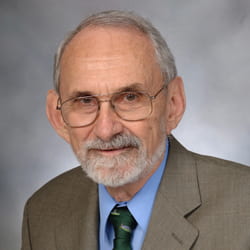By Neal F. Lane, Ph.D.
Senior Fellow in Science and Technology Policy
Professor of Physics and Astronomy Emeritus
My dear friend and long-time Rice colleague, Robert (Bob) F. Curl, died on July 3, 2022. He was one of the smartest scientists and kindest persons I have ever known. Bob retired as university professor in 2008 but continued to be actively involved in the Department of Chemistry and served as a Baker Institute Rice faculty scholar.
Bob was internationally renowned as one of the world’s most distinguished chemists. After graduating from Rice in 1954, he swiftly earned his Ph.D. at Berkeley, studying with Kenneth Pitzer, who would become Rice’s third president; carried out postdoctoral research at Harvard with Nobel laureate E. Bright Wilson; and returned to Rice in 1958 as an assistant professor of chemistry. He shared the 1996 Nobel Prize in Chemistry with Rice professor Richard Smalley and Harry Kroto (then of the University of Sussex) for their 1985 discovery of a new all-carbon hollow molecule C60, or Buckminsterfullerene, which was a key discovery in the emerging field of nanotechnology.
I didn’t arrive at Rice until 1966, when I joined the faculty as an assistant professor of physics. Whenever I didn’t understand something about a particular molecule, Bob was always happy to talk. And in his patient and self-effacing manner, he always had the answers. Rice was a small place in those days, and several of us who were interested in atoms and molecules – chemistry or physics – formed a small club, which we called the “Rice Quantum Institute (RQI).” Bob and Rick Smalley, who arrived on campus in 1972, were key members of the institute. Over a decade later, when George Rupp came to Rice as its fifth president, he established several new interdisciplinary research institutes modeled on RQI. Several of those are active today, including the Baker Institute for Public Policy, which evolved from an earlier center and, of course, was made possible by the endorsement and leadership of Secretary James A Baker, III.
Following his retirement from the faculty in 2008, Bob broadened his interests to include the impact of technology on society, e.g., how automation might impact employment in the U.S. As one example, Bob Curl and his collaborator, Rice economics professor Dagobert Brito, wrote a 2020 paper with the title “Automation does not kill jobs; it increases inequality,” based on economic modeling. While many economists have been concerned that automation will result in a loss of jobs, Curl and Brito conclude that automation leads to two main outcomes: increased inequality and economic growth. Curl brought to this work the same kind of penetrating inquiry that had characterized his contributions to chemistry. Bob Brito put it this way: “Bob Curl was a role model and an example of what good professors should be. When he retired, I agreed to teach him economics and he agreed to teach me quantum mechanics. I learned to do the operations but I never developed an intuition. Bob learned economics and he developed a deep intuition about economics. He was a great collaborator and I will miss him.”
Bob was a fellow of the National Academy of Sciences, the American Academy of Arts and Sciences, and several other honorary societies, and he had received many awards in addition to the 1996 Nobel Prize in Chemistry. He played a key role in making Rice University the great institution it is today.
Neal F. Lane, Ph.D., is the senior fellow in science and technology policy at the Baker Institute. He is also the Professor of Physics and Astronomy Emeritus at Rice University. Previously, Lane served in the federal government as assistant to the president for science and technology and director of the White House Office of Science and Technology Policy from August 1998 to January 2001, and he served as director of the National Science Foundation and member (ex officio) of the National Science Board from October 1993 to August 1998. Before his post with NSF, Lane was provost and professor of physics at Rice, a position he had held since 1986.
